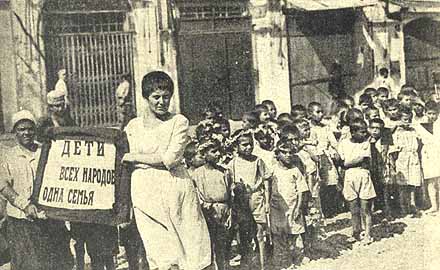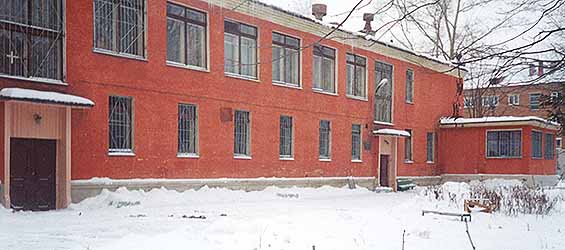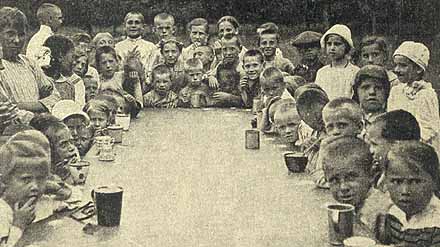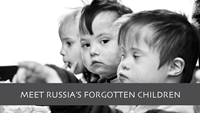Life in the Orphanage

An Overview of the System
It is difficult to imagine a complex system of different types of institutions operating in the West to take care of hundreds of thousands of unwanted children, where emphasis is on an the individual approach and on cushioning and solving personal tragedy. But we in the west are also very lucky that the general population of most or our home countries is wealthy enough to absorb the social shock that the system receives when children are left without anyone to care for them. In Russia, this is far from being true; at the moment there is simply no alternative to institutional care for the majority of orphaned children. In the long term, ROOF's main goal is, of course, to work ourselves out of existence. Optimistically, this could take 30 or 40 years-even with an economic upturn. Some older orphanage personnel are now working with their third generation of institutionalised children -- social problems run in the family and die hard. But many teachers and directors are completely dedicated to these children who are not their own. And many orphanage directors and staff think that adoption and foster care would be far preferable to institutionalisation. Negative and unhelpful attitudes among staff seem to arise more from feelings of desperation in front of an impossibly difficult situation than from a real belief that this enormous institutional child care system should continue to exist because 'it's better for the children.'
 Initiatives to develop adoption and foster care systems are steadily gaining acceptance in Russia and the government does support them. In parallel with this development, ROOF is here to support orphanage personnel in their quest to help prevent today's orphanage population from giving rise to another one. If we are truly successful we will support the orphanages out of existence. But at the moment, the majority of children who find themselves without parental care are taken first to a Temporary Isolation Centre or Priyut (see below), and then transferred to one of the several types of child care institution that exist in Russia. If a child is separated from parents at birth, then he or she will go into a Dom Rebyonka before moving on to one of the types of orphanage for 'over-fives'.
Initiatives to develop adoption and foster care systems are steadily gaining acceptance in Russia and the government does support them. In parallel with this development, ROOF is here to support orphanage personnel in their quest to help prevent today's orphanage population from giving rise to another one. If we are truly successful we will support the orphanages out of existence. But at the moment, the majority of children who find themselves without parental care are taken first to a Temporary Isolation Centre or Priyut (see below), and then transferred to one of the several types of child care institution that exist in Russia. If a child is separated from parents at birth, then he or she will go into a Dom Rebyonka before moving on to one of the types of orphanage for 'over-fives'.
 There are several types of institutions in Russia that we can refer to as 'orphanages'. These are some of the most common:
There are several types of institutions in Russia that we can refer to as 'orphanages'. These are some of the most common:
- Detskii dom -- Home for orphaned school-aged children (most often the children receive their schooling in neighbourhood state schools if they live in a detskii dom);
- School-Internat -- This is primarily an special educational institution of one type or another, though it can often also be home to a group of orphaned school-aged children, who fall into (or have been placed into) the school's profile group;
- Uchebno-Vospitatelnii Kompleks (UVK) -- this is typically a large school, also attended by children in the surrounding area, which serves as a home to a group of orphaned children or children with other specific difficulties;
- Priyut -- this is 'safe haven' where orphans and victims of domestic violence and abuse are sent (usually for only a few months) before being sent to the Det-dom;
- Temporary Isolation Centre -- this is the wing of the Ministry of the Interior that picks up street children and runaways.
 The number of children entering into the Russian institutional child care system has been constantly rising since 1991 and the fall of the Soviet Union. One of the major reasons for this is the economic depression which all of Russia is experiencing. Even parents who would rather not give up their children have had to because they cannot feed them. In addition, alcoholism and drug abuse, prostitution as a way of life and many other unhealthy lifestyles that result in parents being deprived of parental rights have risen sharply in the last 20 years; this is simply because people are depressed at a life that seems fairly hopeless. This is a crisis situation for the country at large, because children do not receive a proper education in the orphanage system, nor do they have access to anywhere near ideal conditions in which to 'adapt' to independent life in society. A lack of properly trained social workers to give care and attention to young children in institutions leads to misdiagnosis of mental problems at the age of 4 or 5, such as the common diagnosis of 'oligophrenia'.
The number of children entering into the Russian institutional child care system has been constantly rising since 1991 and the fall of the Soviet Union. One of the major reasons for this is the economic depression which all of Russia is experiencing. Even parents who would rather not give up their children have had to because they cannot feed them. In addition, alcoholism and drug abuse, prostitution as a way of life and many other unhealthy lifestyles that result in parents being deprived of parental rights have risen sharply in the last 20 years; this is simply because people are depressed at a life that seems fairly hopeless. This is a crisis situation for the country at large, because children do not receive a proper education in the orphanage system, nor do they have access to anywhere near ideal conditions in which to 'adapt' to independent life in society. A lack of properly trained social workers to give care and attention to young children in institutions leads to misdiagnosis of mental problems at the age of 4 or 5, such as the common diagnosis of 'oligophrenia'.
If there is any single great truth that ROOF has observed from the earliest years of our work, it is that conditions in any given orphanage depend almost entirely upon the director, his or her heart for the children, and his or her ability to attract useful help at no expense. Some directors are nearly saints, some are almost the opposite.



